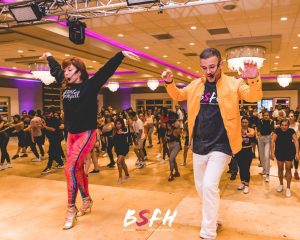
Bachata’s Cross-Over Moment: Why Music’s Hottest Trend is Transforming How America Dances
The first clues were on your phone. “La Bachata” by Colombian singer Manuel Turizo leapt from a Latin-only sleep to a Hot 100 regular; TikTok feeds filled with couples spinning to Prince Royce classics; Romeo Santos sold out baseball stadiums usually reserved for rap giants. Latin music revenue in the United States pushed past $1.4 billion last year — an all-time high — and, in Q1 2025, Latin music claimed the fastest-growing share of all on-demand streams.
Numbers tell part of the story, but the real heat comes from the dance floor. That’s where Damian Guzman, founder of Bachata Sensual America, has become a quiet architect of the genre’s American surge. While labels chase chart positions, Damian turns hotel ballrooms into three-day dance marathons that pull fans from over 30 states, 20+ countries, and every corner of the musical universe.
From shy engineer to scene-builder
Damian grew up in Santurce, Puerto Rico, a neighborhood where street murals and reggaeton bass lines fight for attention. He studied engineering, worked odd jobs, and rarely stepped out of his comfort zone — until a friend dragged him to the DC Bachata Congress in 2013. The footwork hit first, then the intimacy of the lead-and-follow, then the realization that a dance born in the Dominican countryside could level every social barrier in a single eight-count.
So, Damian did what engineers do: reverse-engineered the craft. Trips to Spain followed, where he trained under Korke and Judith, the creators of the modern Bachata Sensual style. Certification in hand, he landed in Houston in 2016 but found that while Salsa had a foothold, Bachata barely registered.
Building a movement in Houston
Damian launched small socials dubbed Houston Loves Bachata. He partnered with neighborhood studios, taught newcomers the rhythm behind the beat, and emphasized connection over flash.
Momentum snowballed. By Memorial Day 2021, while most live events were still crawling back from lockdown, Damian gambled on a full-scale festival. Over three days, the first Bachata Sensual Festival Houston turned a downtown hotel into an international block party. Within two years, attendance tripled, drawing dancers from Alaska to Argentina.
Headliners mattered — Latin Grammy-winner Daniel Santacruz, viral duo Luis & Andrea, Spain’s Korke & Judith — but the hook was the vibe. Workshops run from daylight to dusk, socials stretch past sunrise, and at least once a night, a complete stranger becomes your new favorite dance partner. The festival’s code is visible at the door: “Respect the music, respect your partner, respect yourself.”
Why hip-hop crowds are paying attention
Bachata’s crossover parallels how reggaeton invaded American radio a decade ago, but its gateway isn’t bass drops — it’s proximity. The dance demands eye contact, micro-cues, and trust. After years of pandemic isolation and algorithm-fed loneliness, proximity feels radical.
For club kids raised on trap and Afrobeats, bachata offers a new canvas: slow-to-mid-tempo, percussive, and endlessly remixable. DJs at Damian’s Houston socials routinely blend A Boogie wit da Hoodie verses over Romeo Santos instrumentals. The crowd doesn’t blink; it cheers.
Streaming data backs the mood. Latin music’s share of U.S. listening jumped from 7.5 percent in 2023 to 8.1 percent in 2024, the biggest gain of any genre. Songs like Turizo’s “La Bachata,” which peaked on multiple global charts in 2022 and still racks up millions of weekly streams, primed non-Spanish-speaking listeners for the style’s bittersweet guitar lines. Now, local influencers post “First Bachata, Then Brunch” reels, and #BachataSensual tags clear 500 million views.
Community first, choreography second
Damian insists the dance is for everyone. Absolute beginners share floors with touring professionals. Queer couples lead and follow without comment. Between classes, the team is constantly promoting consent and breaking down how to ask for — and gracefully refuse — a dance. “The steps matter,” he says, “but the feeling matters more. If you walk away having laughed with a stranger, that’s a win.”
That ethos bleeds into the city. Houston hotels fill, Uber drivers log record weekends, and local taquerías keep grills hot until 4:00 A.M. The Greater Houston Partnership estimates the festival pumped six figures into the local economy last year through lodging, dining, and late-night merchandise splurges. Area studios report enrollment spikes every June as newcomers chase the post-festival high.
Spreading the sway
This September, Damian pilots the formula north with Bachata Sensual Festival Chicago. Los Angeles and New York are also on deck, yet he refuses to franchise the vibe. Each city will partner with local crews, pull in neighborhood vendors, and spotlight regional DJs alongside the global stars.
“You can’t mail in community,” Damian says. “You have to dance it into existence.”
The rhythm ahead
Bachata has been humming out of Dominican radios since the 1960s, but something different is happening now. Streaming has erased genre borders; pandemic isolation made touch a luxury; generations raised on algorithmic playlists crave an analog heartbeat. Damian’s festivals meet that moment, proving a simple formula: one guitar line, two beats, three minutes of mutual respect.
As the last bongos crash echoes through a Houston ballroom at 7:00 A.M., sweaty dancers spill into the lobby, still swaying, still smiling. They’ll nap, shower, and return for another 12-hour sprint. When the weekend ends, they’ll fly home to Brooklyn lofts, Kansas City suburbs, and Seattle tech campuses — carrying new playlists, new footwork, and the confidence from holding rhythm with a stranger.
That’s how cultures shift: not with a single viral hit or a corporate sponsorship, but with thousands of tiny, joyful collisions on crowded dance floors. In 2025 America, bachata isn’t just a soundtrack. Thanks to Damian Guzman, it’s a verb — and the country is ready to move.